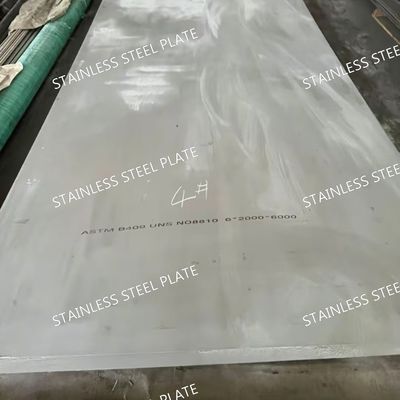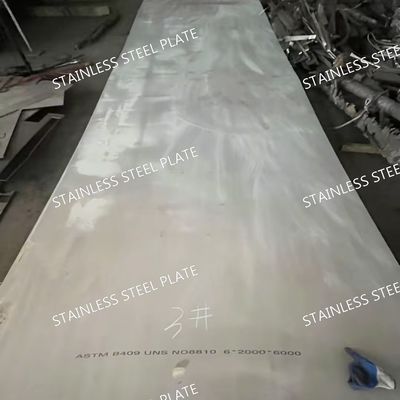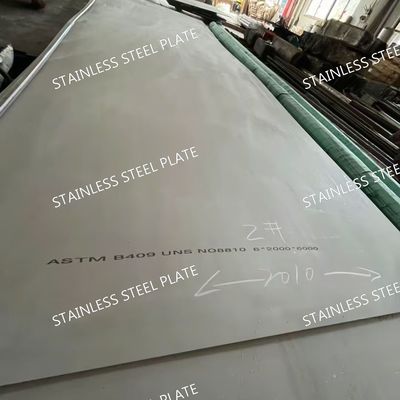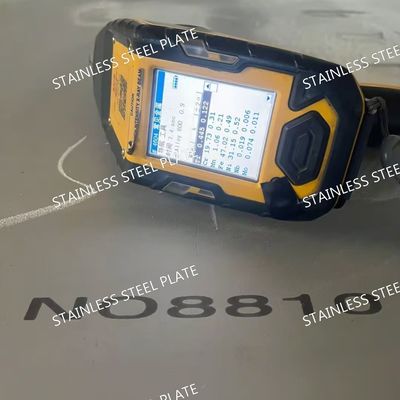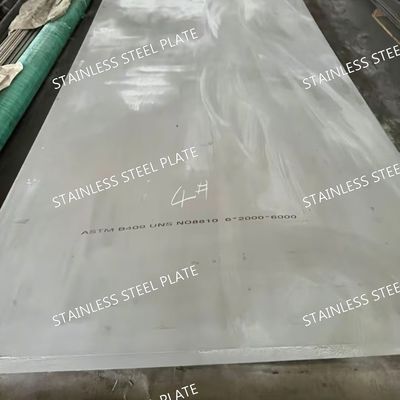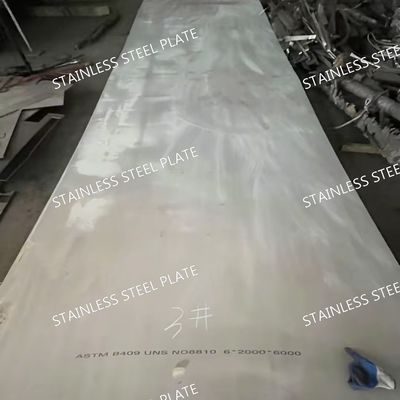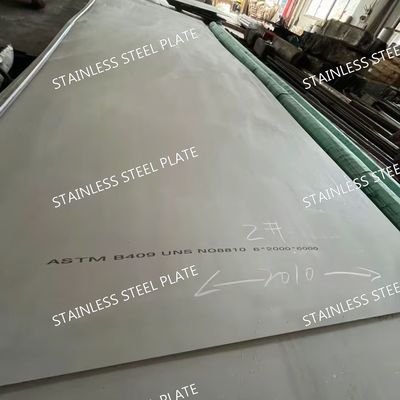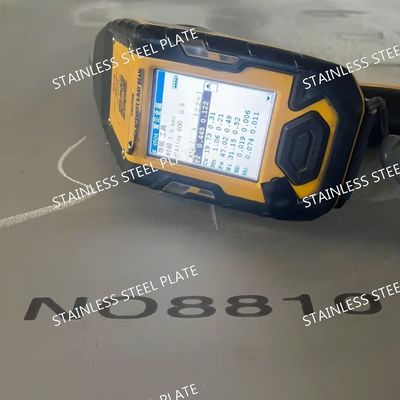-
 Raian IonescuMaterial quality very good. we have cooperate more than 10 Years. They trade lots kinds of steel material. All material quality good. They duty for all material quality. We are planing continue cooperate with them in the future
Raian IonescuMaterial quality very good. we have cooperate more than 10 Years. They trade lots kinds of steel material. All material quality good. They duty for all material quality. We are planing continue cooperate with them in the future
Durable 316LN Stainless Steel Sheet & Plate Thickness 1.0 - 80.0mm Perfect for Chemical Processing
| Products | Stainless Steel Plate | Grade | 304 304L 316L 316LN 310S 321 2205 2304 2507 904L 254SMO 630 .etc |
|---|---|---|---|
| Thickness | 1.0 - 80.0mm | Width | 1219mm 1500mm 1800mm |
| Surface | NO.1 2B | Brand | BAOSTEEL TISCO |
| Standard | ASTM EN DIN JIS GB | Loading Port | Shanghai Port |
| Highlight | 316LN stainless steel plate for chemical processing,Durable stainless steel sheet with warranty,Stainless steel plate thickness 1.0-80.0mm |
||
Durable 316LN Stainless Steel Sheet & Plate Thickness 1.0 - 80.0mm Perfect for Chemical Processing
Products Specification
| Products Name | 316LN Stainless Steel Plate Sheet |
| Main Grades | Stainless Steel J1, J2, J4, 201, 202, 301, 304, 304H, 304L, 309, 309S, 310, 310S, 316, 316L, 316LN,316TI, 317L, 321, 321H, 347,348, 409, 410, 410S, 420, 430, 441, 904L,630,631,254SMO,654SMO,253MA,2205,2304,2507.etc |
| Thickness | 0.6 - 80.0mm |
| Width | 1250mm,1500mm ,1800mm,2000mm, or custom other size as request |
| Length | 2000mm, 2440mm, 3000mm, 5800mm, 6000mm, AS PER CUSTOMER’S REQUIREMENT |
| Service | Laser Cutting |
| Form | Plate / sheet |
| Cutting Shape | Round , Square, or any special shape as request |
| Test Certificate | Yes. |
| Finish | NO.1, 2B, 2D, 2H, 2R, No.4, HAIRLINE, SCOTCH BRITE, SATIN FINISH, NO.8, BA. |
| Brand | TISCO, LISCO,BAOSTEEL , POSCO, JISCO |
Durable 316LN Stainless Steel Sheet & Plate Thickness 1.0 - 80.0mm Perfect for Chemical Processing
Introduction
316LN stainless steel, an enhanced version of the standard 316 stainless steel, is a versatile material renowned for its high strength, excellent corrosion resistance, and improved mechanical properties. It is specifically alloyed with nitrogen to provide enhanced performance in critical applications. This grade of stainless steel is especially popular in industries that require durable, high-performance materials, such as chemical processing, aerospace, marine, and pharmaceuticals.
Our 316LN stainless steel sheets and plates, ranging from 1.0 mm to 80.0 mm in thickness, are manufactured to the highest standards and can meet the most demanding industrial applications. With a superior balance of corrosion resistance, strength, and formability, 316LN is a top choice for applications involving exposure to extreme environments.
Chemical Composition
316LN stainless steel is an austenitic stainless steel alloy that contains a precise mix of elements to enhance its resistance to corrosion, strength, and durability. The chemical composition is as follows:
| Element | % by Weight |
|---|---|
| Iron (Fe) | Balance |
| Chromium (Cr) | 16.00 - 18.00% |
| Nickel (Ni) | 10.00 - 14.00% |
| Molybdenum (Mo) | 2.00 - 3.00% |
| Manganese (Mn) | 2.00% max |
| Silicon (Si) | 1.00% max |
| Phosphorus (P) | 0.045% max |
| Sulfur (S) | 0.030% max |
| Nitrogen (N) | 0.10 - 0.16% |
| Carbon (C) | 0.03% max |
The addition of nitrogen (N) significantly improves the material's strength and resistance to intergranular corrosion, making it ideal for harsh environments. This alloy maintains excellent formability, even at high temperatures, which is crucial in the manufacturing of large, complex structures.
Product Features
-
Corrosion Resistance
316LN stainless steel offers superior resistance to pitting, crevice corrosion, and general corrosion. It is particularly resistant to acids such as sulfuric and hydrochloric acid, making it ideal for use in aggressive chemical environments. -
High Strength & Durability
With higher tensile and yield strength compared to standard 304 stainless steel, 316LN provides excellent strength retention at high temperatures, ensuring the longevity of products used in elevated stress conditions. -
Enhanced Weldability
The low carbon content in 316LN reduces the risk of carbide precipitation during welding, which can lead to corrosion. This feature makes it an excellent choice for welded structures. -
Excellent Toughness at Low Temperatures
This alloy retains its toughness even at low temperatures, ensuring reliable performance in cryogenic and subzero conditions, as well as a wide range of other temperature extremes. -
Resistance to Chloride Stress Corrosion Cracking
The inclusion of nitrogen provides resistance to chloride stress corrosion cracking, which is crucial for applications in environments with high concentrations of chlorides, such as marine environments or chemical processing plants. -
Easy Formability and Fabrication
316LN stainless steel is known for its ability to be easily processed, machined, and fabricated into various shapes and sizes, making it an ideal choice for custom components in industrial applications.
Production Process
The production of 316LN stainless steel sheets and plates involves several key steps to ensure that the material meets strict standards for strength, corrosion resistance, and mechanical properties:
-
Melting and Alloying
The raw materials (iron, chromium, nickel, molybdenum, etc.) are melted in an electric arc furnace at high temperatures. The alloying elements are then added in precise quantities to achieve the desired chemical composition. -
Casting
After the alloy is created, it is cast into billets or slabs. These slabs are then cooled and solidified before proceeding to the next stage of rolling. -
Hot Rolling
The slabs are heated to high temperatures and passed through rollers to reduce their thickness. Hot rolling imparts the desired thickness and improves the material’s overall mechanical properties. -
Cold Rolling
After hot rolling, the stainless steel is cold-rolled to fine-tune its dimensions and improve its surface finish. Cold rolling also enhances the strength and hardness of the material. -
Annealing
The steel is then annealed in a furnace to relieve internal stresses, improve ductility, and further enhance corrosion resistance. -
Pickling & Passivation
The steel undergoes a pickling process (using acid solutions) to remove scale and other impurities from the surface. Passivation is then done to further enhance the material’s resistance to corrosion by forming a thin, protective oxide layer. -
Cutting & Finishing
Finally, the steel sheets and plates are cut to size based on customer specifications. These pieces are inspected for quality, and any necessary finishing (such as polishing or coating) is applied.
Applications
316LN stainless steel is widely used in industries requiring high-performance materials that can withstand challenging environments. Key applications include:
-
Chemical Processing
316LN is commonly used in the chemical industry for manufacturing storage tanks, pipes, reactors, and heat exchangers. Its excellent corrosion resistance makes it ideal for handling aggressive chemicals, acids, and solvents. -
Pharmaceutical Industry
The pharmaceutical industry requires materials that do not react with the compounds being processed. 316LN stainless steel is often used in the fabrication of equipment such as mixers, reactors, and containers that come in contact with sensitive substances. -
Marine & Offshore Applications
Due to its high resistance to chloride-induced corrosion, 316LN is widely used in marine environments for making components such as ship hulls, offshore platforms, and piping systems exposed to seawater. -
Aerospace
316LN stainless steel is used in aerospace applications, particularly in parts that must endure extreme temperatures and conditions, including exhaust systems, airframes, and fuel systems. -
Food Processing
The non-reactive properties of 316LN make it a favorite in the food and beverage industry, where hygiene is paramount. It's used in machinery, pipes, and containers in food processing plants. -
Architectural Applications
316LN is also utilized in the architectural industry, particularly for exterior cladding, handrails, and facades, thanks to its ability to resist atmospheric corrosion.
Export Packaging
To ensure that the 316LN stainless steel sheets and plates arrive at their destination in optimal condition, we take great care in packaging. Our export packaging includes:
-
Wooden Pallets
The sheets and plates are packed securely on wooden pallets to prevent any shifting during transportation. The pallets are treated to meet international shipping standards (ISPM 15), ensuring they are free from pests and disease. -
Plastic Wrapping & Shrink Film
Each piece of stainless steel is wrapped in high-quality plastic film to protect against moisture, dust, and handling damage. The shrink film secures the sheets tightly, preventing any external contaminants from coming in contact with the material. -
Corrosion Protection
In addition to the plastic wrapping, corrosion inhibitors are used to provide additional protection during long-distance transportation, especially in humid environments. -
Custom Markings
Each package is clearly marked with product details, including the material grade, size, and weight, to ensure easy identification and proper handling during customs clearance and delivery. -
Shipping Containers
All packaged stainless steel sheets and plates are placed inside sturdy, labeled shipping containers to prevent damage during international transit.
Conclusion
316LN stainless steel sheets and plates are engineered to meet the toughest requirements in chemical processing, marine, aerospace, and various other industries. With its superior corrosion resistance, high strength, and versatile formability, 316LN is a premium choice for critical applications. Whether you're looking for material for storage tanks, reactors, or custom components, our 316LN stainless steel products are designed to provide long-lasting performance and value.
![]()
![]()
![]()
![]()



